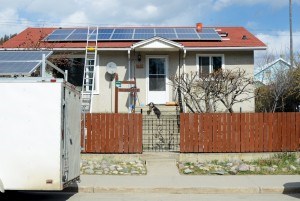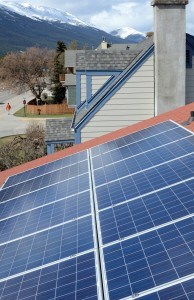
A Jasper family is harnessing the power of the sun, after 16 solar panels were installed on its Connaught Drive home.
“It’s exciting,” said Patti Urie, who has been researching solar energy for the past few years and finally took the plunge, hiring Great Canadian Solar to outfit her home.
“Solar energy is the cleanest source of energy available on the planet and our house is perfectly set up for it—we’re south facing, we don’t have any trees shading us and our roof surface is without obstacles, it’s perfect,” she said April 15 as two electricians worked on her roof.
The Uries chose a solar photovaltaic (PV) system to produce electricity for their home, as opposed to a solar thermal system that produces heat. The PV cells convert sunlight into direct current (DC) power, and an inverter then converts that DC electricity into the alternating current (AC) electricity used in their home.

The $11,000 project will allow the family to generate nearly enough electricity to power their home, however no more than that.
“The government doesn’t actually want you to be in the business of selling power,” explained Urie, referring to Alberta’s Micro-generation Act, which was designed to allow installations up to the size of the owner’s annual consumption, but not above.
“We have room for another four panels on our roof, but we’re not allowed to put them on because we’re not allowed to install a system where we’re going to be selling our power.
“So they looked at our bills before they designed our system and they saw how much we’re using, then put in a system that works with the amount of power we’re using.”
Although they will be generating most of their own power, the Uries will remain connected to the utility grid, so they can access electricity at times when their solar panels are unable to produce enough energy for their home—for instance, at night.
Urie said she’s excited to track how much electricity the panels create, as well as how much electricity her family is using.
“If we have a low-use month and a really sunny month, it’s possible that we could have a zero bill,” she said. “We’re excited to see if that happens and inspired to use less energy for that reason.”
When she started planning the project, Urie said she hoped the municipality would provide a rebate or incentive program to help with the cost, like it does with energy efficient appliances, but that didn’t come to fruition.
“We’re going into debt to do it, but it’s kind of one of those things where it’s the responsible thing to do,” said Urie’s husband, Joe. “Bottom line, it’s just the right thing to do.”
As the panels went up April 15, Urie sat on the front stoop, watching the progress.
“It’s exciting,” she said. “I hope we inspire people to move in a positive direction.
“We’re more than happy to chat with people about our experience, the research I did and the different companies I’ve looked at.
“I love talking about this stuff—our number’s in the book, we still have a landline.”
Nicole Veerman
[email protected]
